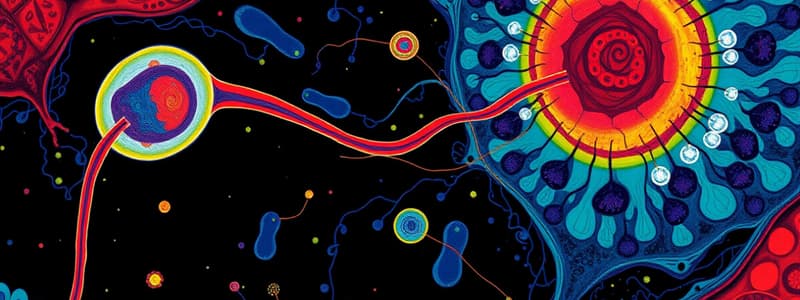Podcast
Questions and Answers
Spermatogenesis occurs in the:
Spermatogenesis occurs in the:
- Prostate gland
- Epididymis
- Seminiferous tubules (correct)
- Ductus deferens
List the correct order of cell stages in spermatogenesis.
List the correct order of cell stages in spermatogenesis.
- Spermatogonium → Primary spermatocyte → Secondary spermatocyte (correct)
- Spermatogonium → Secondary spermatocyte → Primary spermatocyte
- Primary spermatocyte → Secondary spermatocyte → Spermatogonium
- Primary spermatocyte → Spermatogonium → Secondary spermatocyte
Name the first haploid cell (with 23 chromosomes) produced during spermatogenesis.
Name the first haploid cell (with 23 chromosomes) produced during spermatogenesis.
Secondary spermatocyte
The second meiotic division (meiosis II) of spermatogenesis results in the formation of secondary spermatocytes.
The second meiotic division (meiosis II) of spermatogenesis results in the formation of secondary spermatocytes.
During spermatogenesis, a spermatogonium divides by mitosis to produce:
During spermatogenesis, a spermatogonium divides by mitosis to produce:
Describe the fate of each spermatid.
Describe the fate of each spermatid.
Place the events occurring during spermatogenesis in order: 1) _____ 2) _____ 3) _____ 4) _____ 5) _____ 6) _____
Place the events occurring during spermatogenesis in order: 1) _____ 2) _____ 3) _____ 4) _____ 5) _____ 6) _____
Place the events occurring during oogenesis in order: 1) _____ 2) _____ 3) _____ 4) _____ 5) _____ 6) _____
Place the events occurring during oogenesis in order: 1) _____ 2) _____ 3) _____ 4) _____ 5) _____ 6) _____
DIFFERENCES - Match the statements to the correct process (spermatogenesis or oogenesis):
DIFFERENCES - Match the statements to the correct process (spermatogenesis or oogenesis):
Describe the chromosome number before and after meiosis II.
Describe the chromosome number before and after meiosis II.
Describe the chromosome number before and after the first meiotic division (meiosis I).
Describe the chromosome number before and after the first meiotic division (meiosis I).
Germ-line cells are haploid but gametes are diploid.
Germ-line cells are haploid but gametes are diploid.
The chromosome number is reduced during the first meiotic division (meiosis I).
The chromosome number is reduced during the first meiotic division (meiosis I).
Flashcards are hidden until you start studying
Study Notes
Spermatogenesis Overview
- Takes place in the seminiferous tubules of the male testes.
- Involves a series of cell divisions and transformations leading to the production of sperm cells.
Stages of Spermatogenesis
- The correct order of cell stages is: spermatogonium → primary spermatocyte → secondary spermatocyte.
- The first haploid cell produced is the secondary spermatocyte, containing 23 chromosomes.
Meiotic Divisions
- The first meiotic division (meiosis I) reduces the chromosome number from diploid (2N) to haploid (1N).
- The second meiotic division (meiosis II) does not result in the formation of secondary spermatocytes; this statement is false.
Cell Division Outcomes
- A spermatogonium divides by mitosis to produce one spermatogonium and one primary spermatocyte.
- Spermatids differentiate into mature sperm cells after completion of spermatogenesis.
Spermatogenesis vs. Oogenesis
- Spermatogenesis results in four viable sperm cells, while oogenesis results in one viable ovum and three polar bodies.
- Oogenesis may not complete the full meiotic process, especially in cases where fertilization does not occur.
Chromosome Number Changes
- Chromosome numbers during meiosis:
- Before the first meiotic division (meiosis I), the number is 4N, which reduces to 2N.
- After meiosis II, the chromosome number maintains as 1N (haploid).
Germ-line Cells and Gametes
- Germ-line cells are diploid (2N), while gametes are haploid (1N), contradicting the idea that gametes are diploid.
Key Facts about Meiosis
- The chromosome number is indeed reduced during the first meiotic division (meiosis I), confirming the true statement.
- Both spermatogenesis and oogenesis are forms of gametogenesis, involving meiosis to produce sex cells.
Studying That Suits You
Use AI to generate personalized quizzes and flashcards to suit your learning preferences.



